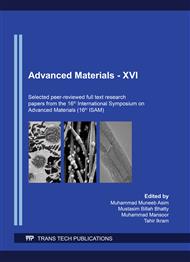[1]
R. Sharma, P. Ganesan, V. Tyagi, Developments in organic solid–liquid phase change materials and their applications in thermal energy storage, Energy Convers. Manag. 95, (2015) 193-228.
DOI: 10.1016/j.enconman.2015.01.084
Google Scholar
[2]
H. Hamdan, N. Ghaddar, D. Ouahrani, K. Ghali, PCM cooling vest for improving thermal comfort in hot environment, Int. J. Therm. Sci. 102 (2016) 154-167.
DOI: 10.1016/j.ijthermalsci.2015.12.001
Google Scholar
[3]
V. Tyagi, S. Kaushik, S. Tyagi, Development of phase change materials based microencapsulated technology for buildings, Renew. Sust. 15(2) (2011) 1373-1391.
DOI: 10.1016/j.rser.2010.10.006
Google Scholar
[4]
Y. Cui, et al. The experimental exploration of carbon nanofiber and carbon nanotube additives on thermal behavior of phase change materials, Sol. Energ. Mat. Sol. C.95(4) (2011) 1208-1212.
DOI: 10.1016/j.solmat.2011.01.021
Google Scholar
[5]
M. Thambidurai, K. Panchabikesan, Review on phase change material based free cooling of buildings—the way toward sustainability, J. Ener. Stor. 4 (2015) 74-88.
DOI: 10.1016/j.est.2015.09.003
Google Scholar
[6]
Information on https://energy.gov/public-services/homes/heating-cooling.
Google Scholar
[7]
Government of Pakistan - Ministry of Finance. Pakistan Economic Survey 2012-13. 2013. Page 195.
Google Scholar
[8]
S. Chandel, and T. Agarwal, Review of current state of research on energy storage, toxicity, health hazards and commercialization of phase changing materials, Renew. Sust. 67 (2017) 581-596.
DOI: 10.1016/j.rser.2016.09.070
Google Scholar
[9]
B. Zalba, J. Marı́n, L. Cabeza, Review on thermal energy storage with phase change: materials, heat transfer analysis and applications, Appl. 23(3) (2003) 251-283.
DOI: 10.1016/s1359-4311(02)00192-8
Google Scholar
[10]
L. Fan, J. Khodadadi, Thermal conductivity enhancement of phase change materials for thermal energy storage - a review, Renew. Sust. 15(1) (2011). 24-46.
DOI: 10.1016/j.rser.2010.08.007
Google Scholar
[11]
H. Inaba, P. Tu, Evaluation of thermophysical characteristics on shape-stabilized paraffin as a solid-liquid phase change material, Int. J. Heat. Mass. Tran. 32(4) (1997) 307-312.
DOI: 10.1007/s002310050126
Google Scholar
[12]
T. Feczkó, L. Trif, D. Horák, Latent heat storage by silica-coated polymer beads containing organic phase change materials, J. Sol. 132 (2016) 405-414.
DOI: 10.1016/j.solener.2016.03.036
Google Scholar
[13]
D. Feldman, M. Shapiro, D. Banu, C. Fuks, Fatty acids and their mixtures as phase-change materials for thermal energy storage, Sol. Ener.Mater. 18(3-4) (1989) 201-216.
DOI: 10.1016/0165-1633(89)90054-3
Google Scholar
[14]
A. Karaipekli, A. Sarı, Capric–myristic acid/vermiculite composite as form-stable phase change material for thermal energy storage, J. Sol. 83(3) (2009) 323-332.
DOI: 10.1016/j.solener.2008.08.012
Google Scholar
[15]
A. Sarı, A. Karaipekli, C. Alkan, Preparation, characterization and thermal properties of lauric acid/expanded perlite as novel form-stable composite phase change material, Chem. Eng. 155(3) (2009) 899-904. ]16] A. Shukla, D. Buddhi, R. Sawhney, Thermal cycling test of few selected inorganic and organic phase change materials, Renew. Ener. 33(12) (2008) 2606-2614.
DOI: 10.1016/j.cej.2009.09.005
Google Scholar
[17]
K. Shahbaz, I.-al Nashef, R. Lin, M. Hashim, F. Mjalli, M. Farid, A novel calcium chloride hexahydrate-based deep eutectic solvent as a phase change materials, Sol. Ener. Mat. Sol. C. 155 (2016) 147-154.
DOI: 10.1016/j.solmat.2016.06.004
Google Scholar
[18]
M. Telkes, Nucleation of Supersaturated Inorganic Salt Solutions, J. Ind. Eng. Chem. 44(6) (1952) 1308-1310.
DOI: 10.1021/ie50510a036
Google Scholar
[19]
R. Naumann, H. Emons, Results of thermal analysis for investigation of salt hydrates as latent heat-storage materials, J. Therm. Anal. Calorim. 35(3) (1989) 1009-1031.
DOI: 10.1007/bf02057256
Google Scholar
[20]
F. Porisini, Salt hydrates used for latent heat storage: Corrosion of metals and reliability of thermal performance, J. Sol. 41(2) (1988) 193-197.
DOI: 10.1016/0038-092x(88)90136-3
Google Scholar
[21]
B. He, V. Martin, and F. Setterwall, Liquid–solid phase equilibrium study of tetradecane and hexadecane binary mixtures as phase change materials (PCMs) for comfort cooling storage, Fluid Phase Equilibr. 212(1-2) (2003) 97-109.
DOI: 10.1016/s0378-3812(03)00270-x
Google Scholar
[22]
S. Kim, S. Chang, O. Chung, S. Jeong, and S. Kim, S. Thermal characteristics of mortar containing hexadecane/xGnP SSPCM and energy storage behaviors of envelopes integrated with enhanced heat storage composites for energy efficient buildings, Energ. Buildings. 70, (2014) 472-479.
DOI: 10.1016/j.enbuild.2013.11.087
Google Scholar
[23]
S. Arshad, M. Naraghi, I. Chasiotis, Strong carbon nanofibers from electrospun polyacrylonitrile. Carbon 49(5) (2011) 1710-1719.
DOI: 10.1016/j.carbon.2010.12.056
Google Scholar
[24]
A. Sarı, Thermal reliability test of some fatty acids as PCMs used for solar thermal latent heat storage applications. Energy Convers. Manag. 44(14) (2003) 2277-2287.
DOI: 10.1016/s0196-8904(02)00251-0
Google Scholar
[25]
M. Rady, Study of phase changing characteristics of granular composites using differential scanning calorimetry. Energy Convers. Manag. 50(5) (2009) pp.1210-1217.
DOI: 10.1016/j.enconman.2009.01.030
Google Scholar
[26]
S. Hashempour, M. Vakili, Preparation and characterization of nano enhanced phase change material by adding carbon nano tubes to butyl stearate. J. Exp. Nanosci. 13(1) (2018) 188-198.
DOI: 10.1080/17458080.2018.1502480
Google Scholar
[27]
S. Shaikh, K. Lafdi, K. Hallinan, Carbon nanoadditives to enhance latent energy storage of phase change materials. J. Appl. Phys. 103(9) (2008) 094302.
DOI: 10.1063/1.2903538
Google Scholar
[28]
Y. Yang, J. Luo, G. Song, Y. Liu, G. Tang, The experimental exploration of nano-Si3N4/paraffin on thermal behavior of phase change materials. Thermochim. Acta. 597 (2014) 101-106.
DOI: 10.1016/j.tca.2014.10.014
Google Scholar


